




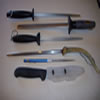
Knife Sharpening Part I By Tom Claycomb III - Today we’ll do an introduction into knife sharpening and cover blade Continue Reading
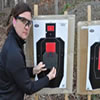
Succeeding with the Fundamentals: It’s in the Details By Michelle and Chris Cerino - The difference between a good shooter and a great shooter is in the details. Continue Reading
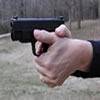
Succeeding with the Fundamentals: Get a Grip By Michelle and Chris Cerino - The primary role of grip is to aid in managing recoil. Continue Reading
Importance of Having a Good Instructor
Finding the right firearms instructor is vitally important. As every person is different, each will have his or her own needs and goals when it comes to training. It is wise to find an instructor that can meet those needs and help one to attain their goals. When choosing the instructor that is right for you, do your research and shop around, possibly even see if you can sit in on a class as an observer. The following factors, while they may or may not be deal breakers for everybody, should all be considered when choosing a firearms instructor.
Firearms safety is paramount. When choosing an instructor, the first thing that should be looked at is safety. Do they teach the fundamentals of safety first thing? Do they stress and follow safety procedures at all times on the range? You should also inquire about his or her emergency protocols, in the event that someone has an accident. Are they prepared with a First Aid Trauma kit and able to deal with a gunshot wound? If the answer to these questions is no, then move along to another instructor, quickly.
Do a search online for reviews on a prospective instructor. See if there are any reviews by former students, and what they had to say about their experience. You may also be able to check with the Better Business Bureau to see if any complaints have been filed against them.
If you are looking for someone to teach you how to shoot, obviously it is important that they have experience shooting. While it may not be necessary for the instructor to have fired millions of rounds downrange, they should be a seasoned shooter. The longer an instructor has been shooting, the more wisdom they have gained that can be imparted on you.
You should make note of what kind of real-world and practical experience your instructor has. If they teach about combat shooting and tactical techniques, do they have a background in the military or law enforcement that would lend credibility to their advice, or do they just teach theory? If they teach about concealed carry, do they actually carry concealed when not on the range?
Everyone likes to have an experienced instructor, someone who has been teaching for quite some time. New instructors shouldn’t necessarily be avoided though, as all teachers have to start at some point. A new teacher can make up for their lack of experience in other ways. When judging an instructors teaching experience, look at how many years they’ve been teaching, where they have taught at, and how recently they have been certified, or re-certified.
All instructors have their own style of teaching. Some may be gruff while others are soft-spoken. Some may quickly rattle through a ton of information while others may go slow and repeat crucial points. A student’s personal preference and learning style are definitely a factor here.
Some instructors tend to specialize in certain aspects of firearms training. While the instructor may be an expert in their preferred field, their knowledge may be lacking in other important areas. If you are looking for close quarters combat training or concealed carry techniques, you may not want to use an instructor that focuses more on hunting or long-range target shooting.
A good instructor should have a broad base of general knowledge about firearms and applicable gun laws in your area. He should be able to instruct you in several various aspects of firearms training. Similar to instructors who only teach a specialty, some only possess knowledge in specialized areas. An instructor should be able to assist you with any problems with your firearm, regardless of type, model or caliber. They should also be able to answer any questions a student may have on a wide variety of topics.
A student’s comfort level with their instructor is vitally important. An instructor who places his students at ease will earn respect and will create a good learning environment. A student that is uncomfortable with their instructor will have a hard time learning or retaining knowledge. If the instructor is intimidating, rude or doesn’t earn respect, students may be afraid to ask questions or choose to ignore the instructor, creating an unsafe environment.
Proper firearms training usually require some one-on-one time between an instructor and student. A large class size means too many students are competing for an instructor’s limited time and attention. In situations like this, quiet students or those who are struggling may not get the personal instruction necessary for them to keep up with the class or fully grasp a principle or technique.
It is a dream of most gun owners to train at one of the few premier firearms training academies around the country. However, probably 99% of gun owners live nowhere near one of these schools. Since time is a valuable commodity for most people, and few can waste it commuting to far off locations, it is wise to find an instructor located in the nearby vicinity. There are resources online that can locate instructors in your area such as the USA Carry.
While it is hard to put a price on proper firearms training, cost is a factor that must be considered. If you are like most people in today’s economy, money for extra things above and beyond normal household budgetary needs is hard to come by. It is completely normal and rational to comparison shop class prices between instructors, with all else being equal. There is nothing wrong with seeking the best value for your money, and good instructors will offer reasonable and competitive prices.
A good firearms instructor is one who will adequately cover all of the fundamentals, and is willing and able to work with you, and your equipment, to make you a better-trained shooter. You want to avoid instructors that rely on gimmicks or trends, or who demand that you use a certain gun or holster, or a specific hold or stance. Obviously, an instructor will have a preference on equipment or techniques, and will try to teach you those ways. But they must be flexible enough to adapt their preferred methods and techniques to accommodate a student’s ability, especially if a student is having trouble understanding or performing.
Choosing the firearms training instructor that is right for you should be a thoughtful decision. Hopefully you will consider some or all of the factors in this list when making your decision. There may also be other factors not in this list that you think are crucial. If so, let us know in the comments below. Each gun owner is an individual, with different tastes, preferences, learning styles and needs, and what is important to one shooter may not be as important to another. Now get to training, have fun and stay safe
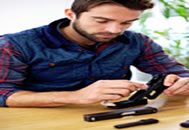
Tips on Lubrication
Let's start with what you shouldn't use - WD40 or anything like it. WD-40 is a fine light duty oil and rust penetrator.
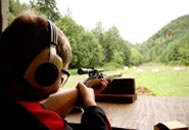
Tips on Headspace
Headspace can be thought of as something like this: The cartridge in your chamber is in a safe with the bolt of the rifle as the door.
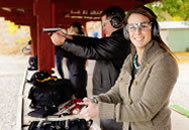
Handgun Tips
Cock the hammer (chamber and magazine empty of course). Without depressing the Grip Safety, pull the trigger. The hammer should NOT...
Copyright © 2015 - All Rights Reserved - Swab-its.com
Swab-its® is a registered trademark of Super Brush LLC
- Disclaimer